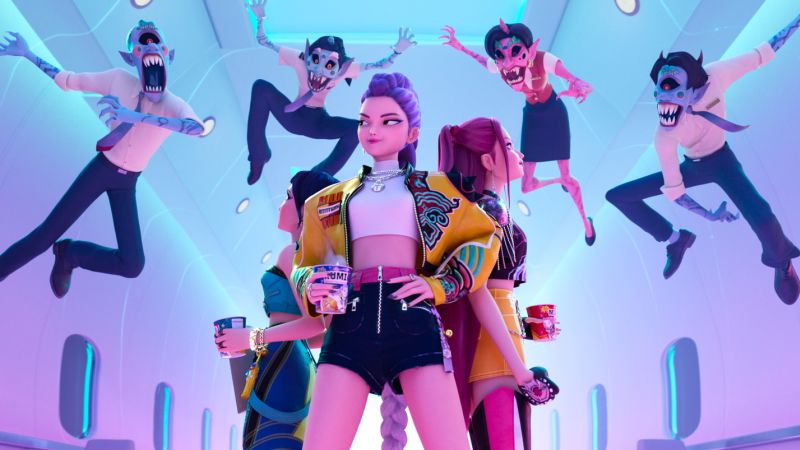K-Pop has undeniably established itself not just as a musical genre, but as a global phenomenon that has significantly influenced pop culture. Its success can be attributed to the fusion of catchy beats, vibrant visuals, and elaborate performances that captivate audiences worldwide. Recently, Netflix has capitalized on this rising trend with the release of its animated film, “KPop Demon Hunters,” which premiered in June. The film has become exceptionally popular and is on track to become Netflix’s most-watched original feature film, highlighting the unstoppable rise of K-Pop into mainstream media.
“KPop Demon Hunters” offers a unique storyline that revolves around a fictional all-girl pop group. The plot thickens as this group not only navigates the challenges of fame but also takes on a supernatural mission. They engage in battles against demons intent on devouring human souls to protect their adoring fans. Adding to the intrigue is a rival boy band that, unbeknownst to the group, consists of these very demons, which opens up a myriad of conflicts and narrative opportunities.
This blend of K-Pop with supernatural elements appears to resonate well with audiences, particularly considering the growing popularity of fantasy-themed content across various media platforms. The combination of these genres—an animated musical existing at the intersection of K-Pop and the supernatural—proves to be an algorithmically favorable configuration, likely to engage a wider variety of viewers.
One of the most appealing aspects of “KPop Demon Hunters” is its impressive voice cast, which includes well-known stars such as Arden Cho, May Hong, Ji-young Yoo, Ahn Hyo-seop, and familiar faces like Ken Jeong and Daniel Dae Kim. Each of these actors not only lends their vocal talents to the characters but also adds to the star power of the project, drawing more attention from existing fans while attracting new audiences curious about the storyline.
The film has effectively revitalized interest in movie soundtracks, with several songs from the film rapidly climbing the charts. Tracks like “Golden,” “Your Idol,” and “Soda Pop” have made their way into the Top 10 on the Hot 100 chart according to Billboard. This resurgence in the popularity of movie soundtracks reflects the profound impact that K-Pop is having on the entertainment industry.
Ian Eisendrath, the executive music producer for the film, expressed his astonishment at the commercial success of the film’s soundtrack. He indicated that, while there’s often hope that a musical film may produce a chart-topping song, the overwhelming reception of multiple songs is even more gratifying. Eisendrath emphasized that the tracks have not only engaged viewers within the context of the film but have also gained traction in wider, mainstream music culture.
This achievement is noteworthy, especially when considering that it has been many decades since movie soundtracks have charted three songs simultaneously in the Top 10. Past examples like the soundtracks for “Saturday Night Fever” (1977) and “Waiting To Exhale” (1995) illustrate how rare this milestone is.
In light of the film’s success, streaming platforms are eager to bring the project to life beyond the screen. Through engagements like “KPop Demon Hunters: A Sing-Along Event,” the magic of the film will be extended to theater audiences across North America, the United Kingdom, Australia, and New Zealand. Scheduled for August 23 and 24, these theatrical events signal a new trend in live viewing experiences, where fan engagement is heightened through communal song and dance, reinforcing the interactive nature of K-Pop culture.
In conclusion, K-Pop’s journey from niche cultural export to a global powerhouse has taken an exciting turn with “KPop Demon Hunters.” By combining elements of musical entertainment, storytelling, and popular cultural themes, the film not only entertains a diverse audience but also reinforces the viability of K-Pop as a staple in contemporary entertainment. The ongoing enthusiasm surrounding K-Pop and its multifaceted approach to storytelling and music indicates a promising horizon for future projects in the genre.











